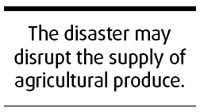Facing quake impact
(China Daily)
Updated: 2008-05-15 07:26
Updated: 2008-05-15 07:26
The earthquake in Sichuan province will put the resilience of the Chinese economy to test again.
Optimists predict that its impact on China's economic growth will be temporary and limited, citing the relatively small proportion of the local economy in the country's gross industrial output and exports.
But the fact that the worst earthquake China suffered in 32 years came only months after the severest winter in 50 years hit central and southern China and disrupted production does not allow policymakers to be too Panglossian.
Instead, the worst inflation in a decade that China is now battling and the global economic slowdown require Chinese policymakers to immediately re-examine their toolbox to prepare for the new challenges the deadly earthquake has posed.
On the one hand, the burning task is to deliver all the needed financial support to facilitate rescue work in the quake-hit regions.

The ministry of finance had allocated 830 million yuan ($119 million) for disaster relief on the first day after the earthquake. And the central bank also provided 5.5 billion yuan to financial institutions in Sichuan and Gansu provinces to increase the cash flow needed for reconstruction.
More such fiscal and monetary aids are badly needed, though the country has adopted a tight monetary policy and a prudent fiscal policy to fight inflation and prevent economic overheating this year.
On the other hand, the possibility that the disaster may disrupt the supply of agricultural produce and stoke inflationary pressure demands close attention from the authorities.
Last month's consumer price index stood at 8.5 percent, slightly lower than the 12-year-record of 8.7 percent witnessed in February. Historical evidence indicates that it usually becomes more difficult to curb price gains after they have reached such an altitude.
Soaring prices of food, especially of agricultural products, have long been the primary driving force behind accelerated inflation.
Sichuan produces 6.1 percent of the country's agricultural output and 7.3 percent of the country's rice. It is also the biggest producer of hogs, 11.6 percent of the country's total.
It is hoped that the fatal earthquake has not affected local agricultural production too seriously. But agricultural losses from the quake should never be underestimated.
(China Daily 05/15/2008 page8)
|
|
|
|